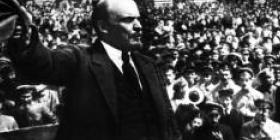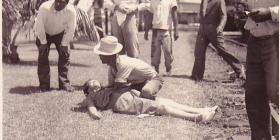On leaving Russia
Russian Jewish anarchist Mollie Steimer, who was deported to Russia, on her being deported from Russia by the Bolsheviks for condemning their persecution of revolutionary workers.
The soviets: the Russian workers, peasants and soldiers councils 1905-1921 - Oskar Anweiler
How Lenin led to Stalin - Workers Solidarity Movement
The Russian revolution and the international proletariat - Maria Koszutska
This collection of articles, published during August 1918 in the newspaper of the PPS-Left, while clearly supportive of the Bolsheviks, discusses many controversial aspects of their rule: the Treaty of Brest-Litovsk, the peasantry, the terror, as well as the question of democracy. Koszutska encourages the international proletariat to take an active part in the events, and help guide them on the correct path to socialism, rather than remain critics on the outside.
The latest deception - Gabriel Miasnikov
In this essay first published in 1930 in France, the founder of the Workers Group denounces the bureaucracy that he claims seized power in a “coup d’état” in 1920 at the Ninth Congress of the CPSU(b)—its “latest deception” being its fraudulent appeals for “freedom of criticism” and “self-criticism” after a series of revolts by workers and peasants in the early to mid-1920s—and calls for a restoration of proletarian democracy (as exemplified by the Paris Commune) by democratizing the functions exercised by bureaucratic State institutions (production, distribution, oversight) and replacing them with Soviets (“Councils”), cooperatives and trade unions.
Democratic centralism, the Workers Opposition, clandestine opposition movements, the crisis in the party, Kronstadt and the end of the revolutionary period in Russia - Michel Olivier
On the construction of socialism - Nikolai Osinsky (Valerian V. Obolensky)
In this text first published in the journal of the Bolshevik left communists, The Communist, in April 1918, Osinsky attacks Lenin’s economic policies (which he attributes to Lenin’s erroneous support for the Brest-Litovsk Peace Treaty) from a “left” perspective that champions working class supremacy in the “organization of production” (in the economic councils, etc.), advocates a policy of rigorous nationalization and promotion of “heavy industry” (coal, steel, railroads), and concludes that economic reconstruction cannot be directed towards Russian “self-sufficiency”, but must be oriented towards the goal of the victory of the international proletarian revolution.
The same, only in a different way - Gabriel Miasnikov
In this essay written in 1920, the Bolshevik left communist Gabriel Miasnikov examines the limitations of the Russian trade unions in the context of what he perceived to be the economic and political supremacy of the soviet institutions, but concludes that the trade unions must be preserved for purposes of domestic public relations (due to the habits of the Russian workers) and international propaganda (due to the predominant concepts concerning revolution outside of Russia where soviet-type institutions do not exist or are quickly destroyed and revolution is conceived as a trade union affair) and therefore they must be given something to do to keep them busy.
Comrades in the Red Army! Insurgent Makhnovists
Another appeal to the Red Army rank and file.
- 1 of 7
- ››











